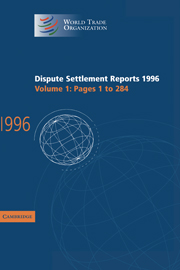Book contents
- Frontmatter
- Contents
- United States – Standards for Reformulated and Conventional Gasoline, complaints by Venezuela (WT/DS2) and Brazil (WT/DS4): Report of the Appellate Body
- United States – Standards for Reformulated and Conventional Gasoline, complaints by Venezuela (WT/DS2) and Brazil (WT/DS4): Report of the Panel
- European Communities – Trade Description of Scallops, requests by Canada (WT/DS7), Peru (WT/DS12) and Chile (WT/DS14): Report of the Panel (Request by Canada)
- European Communities – Trade Description of Scallops, requests by Canada (WT/DS7), Peru (WT/DS12) and Chile (WT/DS14): Report of the Panel (Request by Peru and Chile)
- Japan – Taxes on Alcoholic Beverages, complaints by the European Communities (WT/DS8), Canada (WT/DS10) and the United States (WT/DS11): Report of the Appellate Body
- Japan – Taxes on Alcoholic Beverages, complaints by the European Communities (WT/DS8), Canada (WT/DS10) and the United States (WT/DS11): Report of the Panel
Japan – Taxes on Alcoholic Beverages, complaints by the European Communities (WT/DS8), Canada (WT/DS10) and the United States (WT/DS11): Report of the Appellate Body
Published online by Cambridge University Press: 22 December 2017
- Frontmatter
- Contents
- United States – Standards for Reformulated and Conventional Gasoline, complaints by Venezuela (WT/DS2) and Brazil (WT/DS4): Report of the Appellate Body
- United States – Standards for Reformulated and Conventional Gasoline, complaints by Venezuela (WT/DS2) and Brazil (WT/DS4): Report of the Panel
- European Communities – Trade Description of Scallops, requests by Canada (WT/DS7), Peru (WT/DS12) and Chile (WT/DS14): Report of the Panel (Request by Canada)
- European Communities – Trade Description of Scallops, requests by Canada (WT/DS7), Peru (WT/DS12) and Chile (WT/DS14): Report of the Panel (Request by Peru and Chile)
- Japan – Taxes on Alcoholic Beverages, complaints by the European Communities (WT/DS8), Canada (WT/DS10) and the United States (WT/DS11): Report of the Appellate Body
- Japan – Taxes on Alcoholic Beverages, complaints by the European Communities (WT/DS8), Canada (WT/DS10) and the United States (WT/DS11): Report of the Panel
Summary
INTRODUCTION
Japan and the United States appeal from certain issues of law and legal interpretations in the Panel Report, Japan - Taxes on Alcoholic Beverages (the “Panel Report”). That Panel (the “Panel”) was established to consider complaints by the European Communities, Canada and the United States against Japan relating to the Japanese Liquor Tax Law (Shuzeiho), Law No. 6 of 1953 as amended (the “Liquor Tax Law”).
The Panel Report was circulated to the Members of the World Trade Organization (the “WTO”) on 11 July 1996. It contains the following conclusions:
(i) Shochu and vodka are like products and Japan, by taxing the latter in excess of the former, is in violation of its obligation under Article III:2, first sentence, of the General Agreement on Tariffs and Trade 1994.
(ii) Shochu, whisky, brandy, rum, gin, genever, and liqueurs are “directly competitive or substitutable products” and Japan, by not taxing them similarly, is in violation of its obligation under Article III:2, second sentence, of the General Agreement on Tariffs and Trade 1994.
The Panel made the following recommendations:
The Panel recommends that the Dispute Settlement Body request Japan to bring the Liquor Tax Law into conformity with its obligations under the General Agreement on Tariffs and Trade 1994.
On 8 August 1996, Japan notified the Dispute Settlement Body of the WTO of its decision to appeal certain issues of law covered in the Panel Report and legal interpretations developed by the Panel, pursuant to paragraph 4 of Article 16 of the Understanding on Rules and Procedures Governing the Settlement of Disputes (the “DSU”) and filed a Notice of Appeal with the Appellate Body, pursuant to Rule 20 of the Working Procedures for Appellate Review (the “Working Procedures”). On 19 August 1996, Japan filed an appellant's submission. On 23 August 1996, the United States filed an appellant's submission pursuant to Rule 23(1) of the Working Procedures. The European Communities, Canada and the United States submitted appellees’ submissions pursuant to Rule 22 of the Working Procedures, on 2 September 1996. That same day, Japan submitted an appellee's submission pursuant to Rule 23(3) of the Working Procedures.
- Type
- Chapter
- Information
- Dispute Settlement Reports 1996 , pp. 97 - 124Publisher: Cambridge University PressPrint publication year: 2000
- 33
- Cited by



